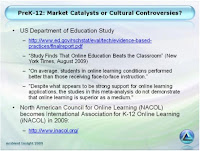For many years an oft-repeated phrase in education was that we needed to raise the bar, meaning we needed to establish higher expectations and help all students attain those higher levels of achievement. I am not a high school teacher, and it has been close to 20 years since I taught in a high school, but I am thinking that the bar has been raised considerably at the high school level.
Thinking back to what I worked on in high school, and what I hear students are working on today in the higher level courses, makes me think that it must be a heck of a lot tougher to be in HS now than in the past. Is that not raising the bar?
By that thinking, the fact that our graduation rates are higher today than they were 20 years ago it makes me think that our schools have done a good job of helping students get up and over the higher bar.
I started thinking about this notion while reading an article online the other day about how schools in Des Moines Iowa are considering creating a fast track high school diploma intended to graduate more students with fewer credits and keep kids from dropping out of school. Is the idea being considered in Iowa proof that we have raised the bar considerably? One rationale presented in support of the concept is the fact that graduation requirements are up considerably since the 1980’s…
What do parents and employers want? What skills are they expecting graduates to have, and can those be learned in a fast track setting?
This school reform stuff is tricky business…
Cheers














